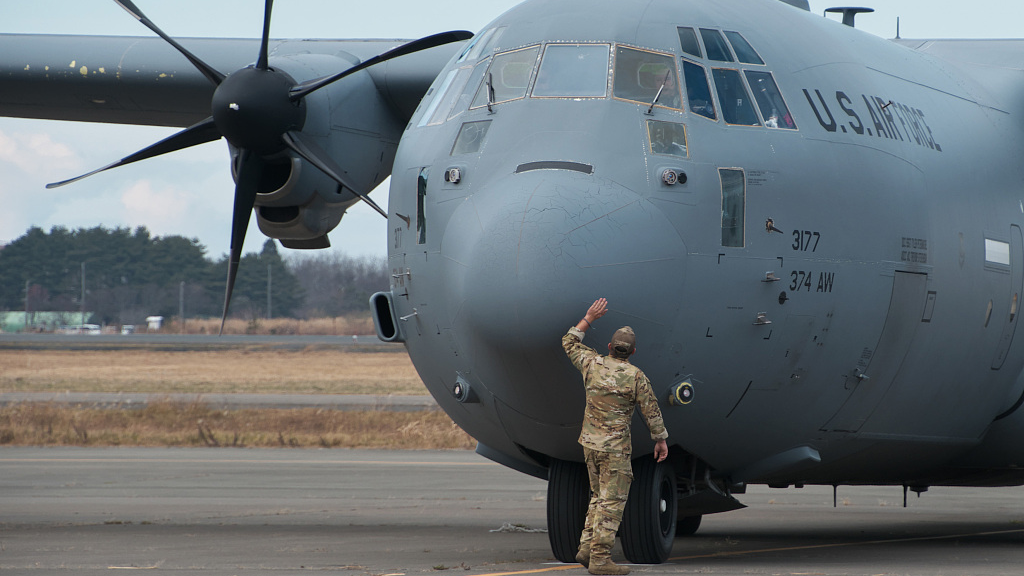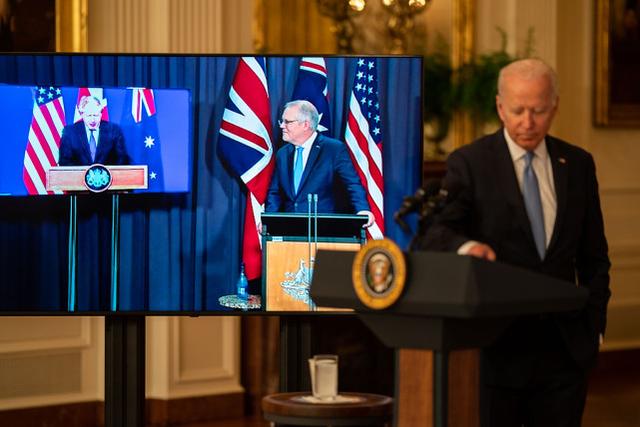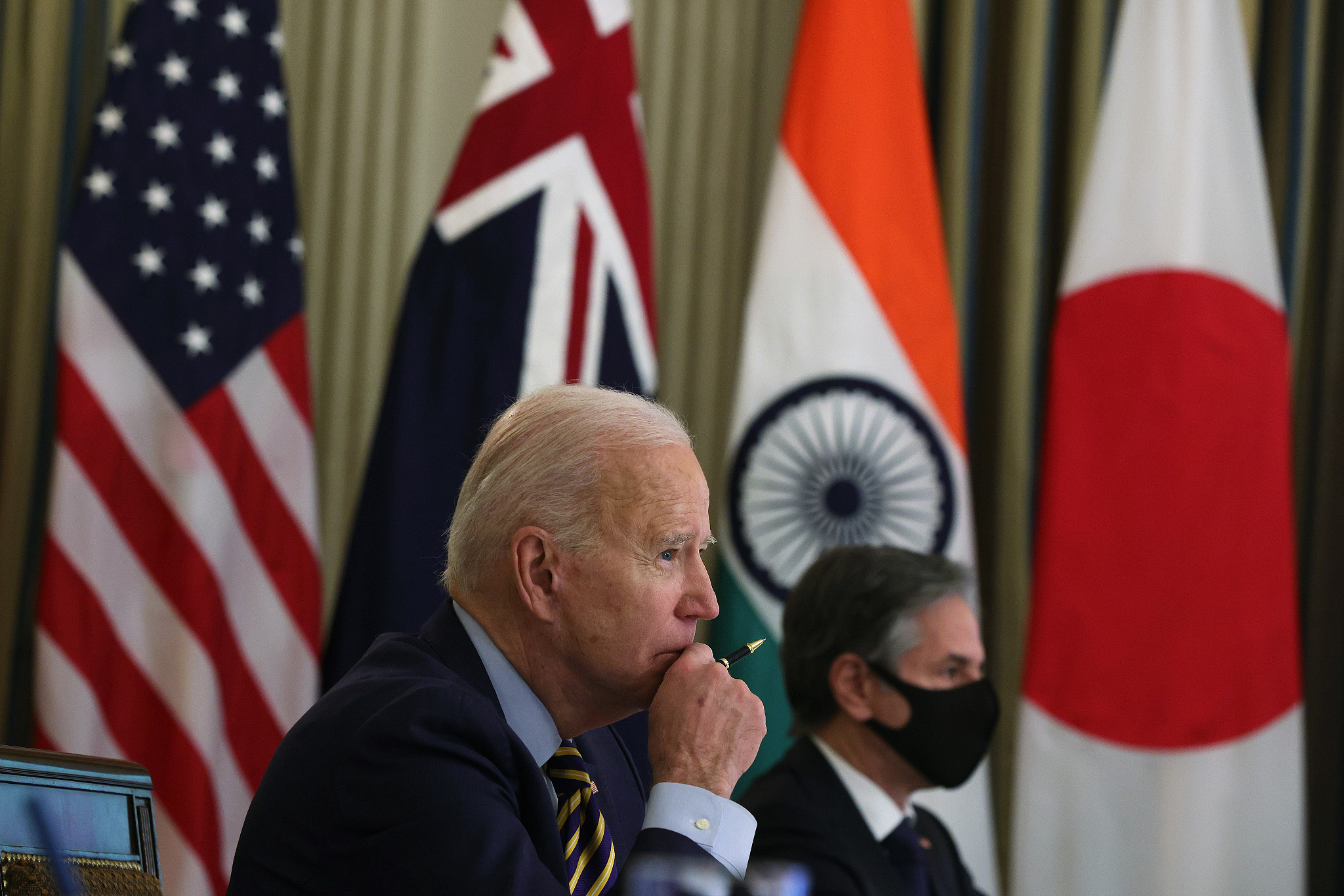
U.S. Air Force C-130J Super Hercules freighted with Marines' HIMARS arrive during Japan-U.S. joint military exercise at Hachinohe Air Base in Aomori-Prefecture, Japan, December 7, 2021. /CFP
U.S. Air Force C-130J Super Hercules freighted with Marines' HIMARS arrive during Japan-U.S. joint military exercise at Hachinohe Air Base in Aomori-Prefecture, Japan, December 7, 2021. /CFP
After four years of isolationism, Democrat President Joe Biden declared "America is back" and made it clear that this time, it is all about values.
The change is immediately apparent in the foreign policy of the new U.S. administration, which seeks to strengthen the U.S. alliance structure that was eroded during the Trump era. As indicated by Biden on multiple occasions, U.S. leadership is the global democracy's defender against "authoritarian forces," namely China and Russia.
This perceived antagonism has given rise to alliances aimed specifically at countering China, including the new trilateral AUKUS pact and the revived Quadrilateral Security Dialogue (the Quad). With their purportedly shared vision for a "free and open Indo-Pacific," American allies like Japan and Australia form the bedrock of the Indo-Pacific Strategy, the regional U.S. alliance to encircle China.
Washington has insisted that these alliances are not "the Asian version of NATO" or trying to build an anti-China coalition, according to Defense Secretary Lloyd Austin. Nevertheless, an important pretext of Biden's value-based diplomacy is China being a threat to democracies in the region, especially in regard to Taiwan.
Unlike some of his predecessors, Biden is framing China as the aggressor, Cai Liang, a senior researcher at the Center for Asia-Pacific Studies of Shanghai Institutes for International Studies, told CGTN. "The language has changed from containing China to maintaining regional peace and stability."
The U.S. has deemed its relationship with China a "once-in-a-generation competition" to win the 21st century, according to Biden. One of the main reasons this administration emphasizes values is that it needs a tool to mobilize domestically and internationally, said Jie Dalei, an expert at the School of International Studies of Peking University.
"For a long-term competition strategy to work, ideology is a convenient mobilizing tool," Jie told CGTN. U.S. pressure aside, this has also influenced the way U.S. allies think about their own national interests, he added.
This week, as Biden convened the inaugural Summit of Democracy to rally allies around its values, Australia and Britain followed the U.S. in announcing a "diplomatic boycott" of the Beijing Winter Olympics over alleged human rights issues.
With this in mind, a closer look at some of the key players in Biden's "democracy" clique and the evolution of these alliances suggests little about democratic values but rather new efforts to keep to the old ways.

U.S. President Joe Biden holds a virtual meeting with Australian Prime Minister Scott Morrison and British Prime Minister Boris Johnson at the White House in Washington, D.C., September 15, 2021. /CFP
U.S. President Joe Biden holds a virtual meeting with Australian Prime Minister Scott Morrison and British Prime Minister Boris Johnson at the White House in Washington, D.C., September 15, 2021. /CFP
'AUKUS'
In September, the U.S. announced a new partnership with Australia and Britain in the Asia-Pacific region known as AUKUS. The all-Anglo pact immediately triggered a diplomatic row between Australia and France over submarine deals.
But the bigger story, as Russia Today reported, is that this all-Western alliance "declared a new Cold War by launching a coordinated military buildup in East Asia unmistakably aimed at China."
Australia recently signed a formal agreement with the U.S. and the UK to acquire nuclear-powered submarines. Meanwhile, the Pentagon has announced plans to improve infrastructure in the Pacific, including Guam and Australia.
A "free and open Indo-Pacific," in other words, is one that is free of Chinese domination, said David Vine, a professor of anthropology at the American University. But by excluding all Asian countries, the three countries signaled the racist, retrograde and downright colonial nature of their alliance, Vine noted.
Despite the optics, Australia's quest for a military upgrade was simply explained as a response to a perceived threat from China. Speaking in Sydney this week, the Biden administration's Indo-Pacific coordinator accused China of trying to "break" Australia through "dramatic economic warfare."
China is Australia's biggest trading partner, but the bilateral relationship has deteriorated to the lowest point in the last two years. It all began when Prime Minister Scott Morrison's government backed Trump's trade war against China, prompting Beijing to retaliate against Australian exports. Joining AUKUS was just confirmation that Australia is taking the side of the U.S. over China, analysts told the BBC.
Britain also has vested interest in the relations with China. Just five years ago, the country marketed itself as the most open Western economy to Chinese investment.
After Brexit and then having its economy bogged down by the pandemic, London has pivoted to the Asia-Pacific for its post-Brexit vision of a "Global Britain," the UK government's 2021 policy review showed.
Although it remains interested in a trade and investment relationship with China, according to the review, post-Brexit Britain has decided to rely on familiar ties within the Anglosphere to pursue deeper engagement in a region far from its shores.

U.S. President Joe Biden and U.S. Secretary of State Antony Blinken participate in a virtual meeting with leaders of Quadrilateral Security Dialogue countries in Washington, D.C., March 12, 2021. /CFP
U.S. President Joe Biden and U.S. Secretary of State Antony Blinken participate in a virtual meeting with leaders of Quadrilateral Security Dialogue countries in Washington, D.C., March 12, 2021. /CFP
Japan and the Quad
The informal grouping of the U.S., Japan, India, and Australia, known as the Quad, is another pillar of the U.S. Indo-Pacific Strategy.
However, the real mastermind behind the Quad, which has existed since 2007, is Japan's former leader Shinzo Abe, who famously described the group as a "democratic security diamond."
It was also the former Japanese prime minister who coined the term "free and open Indo-Pacific" for the first time in 2016. With renewed U.S. support, it seems Abe's regional ambitions are finally materializing.
After leaving office, Abe has dramatically escalated his anti-China rhetoric, including openly supporting separatist forces in the Taiwan region, something he could not do as prime minister.
As Washington's staunch ally in the region, Tokyo will always align itself with U.S. interests on major issues, Cai said. "For Japan, China means economy, and America means security," he told CGTN. "If it had to choose, Japan will always side with the U.S. This has not changed."
But even though Abe still holds considerable sway over Prime Minister Fumio Kishida's government, he no longer speaks for Japan's official policy, Cai noted. "There is a difference between the official and unofficial."
"This allows Japan to play two faces, maintaining its economic ties with China while continuing Abe's foreign policy legacy," he said.

